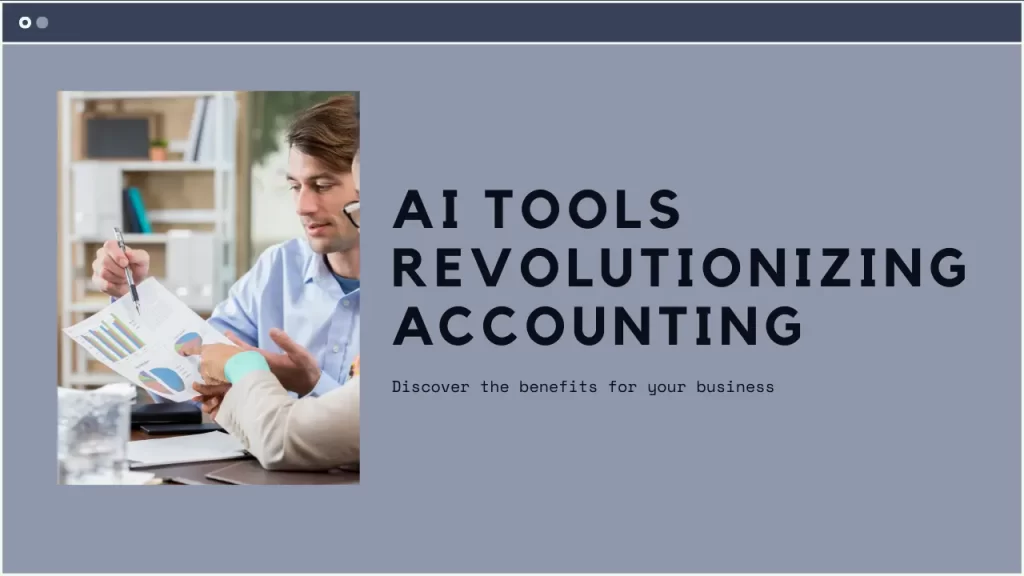In today’s fast-paced business world, accounting has evolved far beyond traditional methods of manual data entry and ledger management. The rise of artificial intelligence (AI) has significantly transformed the accounting landscape, streamlining processes, improving accuracy, and reducing the time spent on repetitive tasks. AI tools for accounting are enabling businesses to enhance financial management, automate complex processes, and make data-driven decisions in real time.
This article explores how AI tools for accounting are revolutionizing the industry, the benefits they offer, and the various AI applications that are helping businesses and accountants optimize their financial operations.
Introduction to AI in Accounting
AI in accounting involves the use of advanced algorithms, machine learning models, and natural language processing (NLP) to automate and optimize various financial tasks. AI tools can process vast amounts of financial data quickly and efficiently, enabling accountants to focus on more strategic, high-value activities rather than manual, time-consuming tasks.
AI applications in accounting can range from simple automation tools that handle data entry to complex systems that provide insights into financial trends, predict future outcomes, and help with decision-making. These tools not only improve operational efficiency but also offer businesses valuable insights that were previously difficult or impossible to obtain manually.

The Benefits of AI Tools for Accounting
AI tools for accounting offer numerous benefits that help businesses save time, reduce costs, and enhance financial accuracy. Some of the key advantages include:
- Increased Efficiency: AI-powered tools can automate repetitive tasks such as invoicing, reconciliation, and payroll processing, freeing up accountants to focus on more critical financial tasks.
- Improved Accuracy: AI tools are capable of identifying patterns and inconsistencies in financial data that might otherwise be missed by human accountants, leading to more accurate financial reporting.
- Cost Savings: By reducing the need for manual intervention in routine accounting tasks, AI tools can help businesses save on labor costs while improving overall efficiency.
- Real-Time Financial Insights: AI tools can analyze financial data in real-time, providing businesses with up-to-date insights and helping them make informed decisions quickly.
- Scalability: As businesses grow, AI tools can scale to handle larger volumes of financial data without requiring additional resources, making them ideal for both small businesses and large enterprises.
Key Applications of AI in Accounting
AI tools have various applications in accounting, streamlining financial processes and improving overall business management. Here are some key AI applications in the accounting field:
Automated Bookkeeping and Data Entry
AI-powered accounting tools can automate time-consuming tasks like bookkeeping and data entry. These tools can extract data from invoices, receipts, and bank statements, and input it into accounting systems with high accuracy. Automation minimizes the risk of human error and saves valuable time that accountants would otherwise spend on manual data entry.
Examples:
- Botkeeper: Botkeeper uses AI to automate bookkeeping, providing businesses with accurate financial data and reports without the need for manual intervention.
- QuickBooks Online: QuickBooks uses AI and machine learning to automate invoice generation, categorizing expenses, and reconciling bank transactions.
Financial Reporting and Analysis
AI tools can automatically generate financial reports, analyze trends, and provide insights into key financial metrics. By processing large amounts of financial data, AI tools can quickly identify areas where the business can improve, such as cash flow management, cost reduction, or profitability.
Examples:
- Fathom: Fathom uses AI to provide real-time financial analysis and reporting, helping businesses assess financial performance and make informed decisions.
- Xero: Xero’s AI-driven dashboard provides automatic financial insights, identifying trends and offering recommendations for improvements.
Fraud Detection and Risk Management
Fraud prevention is a critical aspect of accounting, and AI tools play a significant role in identifying and preventing fraudulent activities. AI systems can analyze large datasets for unusual patterns, flagging potential fraudulent transactions and preventing financial losses. Machine learning algorithms are trained to detect anomalies based on historical data and can improve over time to provide more accurate fraud detection.
Examples:
- KPMG’s AI Fraud Detection Tool: This AI tool uses machine learning to analyze financial transactions and detect patterns that may indicate fraudulent behavior.
- Darktrace: Darktrace employs AI to monitor financial data in real-time and provide businesses with alerts if any suspicious activities are detected.
Tax Preparation and Compliance
AI tools can help businesses automate tax preparation and ensure compliance with ever-changing tax laws and regulations. These tools can automatically calculate tax liabilities, generate tax forms, and keep track of deadlines to avoid penalties. AI also ensures that businesses are up to date with tax regulations, reducing the risk of compliance issues.
Examples:
- Avalara: Avalara uses AI to automate tax calculations and ensure compliance with local, state, and international tax regulations.
- Intuit ProConnect Tax Online: This AI-driven tool helps accountants streamline tax preparation by automatically pulling data from clients’ accounting records and generating accurate tax returns.
How AI Improves Accuracy and Reduces Errors in Accounting
One of the biggest challenges in traditional accounting is the potential for human error. From simple mistakes in data entry to complex errors in financial calculations, inaccuracies can have serious consequences for a business. AI tools help eliminate these errors by automating processes and using machine learning to identify inconsistencies and patterns in financial data.
AI algorithms are designed to continuously learn and improve based on new data, making them more accurate over time. They can process large volumes of data without making the mistakes that a human accountant might make, ensuring more accurate financial records and reports.
AI and Its Role in Enhancing Financial Decision Making
AI tools for accounting do more than just automate tasks; they also provide valuable insights that help business owners and accountants make better financial decisions. By analyzing financial data and identifying trends, AI tools can offer predictions on future financial performance, cash flow, and profitability.
These insights help businesses plan for the future, allocate resources more effectively, and manage risks. AI-driven tools can also assist in scenario planning, allowing businesses to model different financial outcomes based on various factors such as changes in revenue, expenses, or market conditions.
Challenges and Limitations of AI in Accounting
While AI tools for accounting offer numerous benefits, they also come with certain challenges and limitations:
- Cost of Implementation: The initial setup and integration of AI tools into existing accounting systems can be costly, particularly for small businesses.
- Data Security and Privacy: The use of AI requires businesses to share sensitive financial data with third-party providers, raising concerns about data security and privacy.
- Dependence on Quality Data: AI tools rely on high-quality, accurate data to function effectively. If the data fed into the system is incomplete or inaccurate, the insights generated by the AI tool may be flawed.
- Lack of Human Touch: While AI can automate many aspects of accounting, it cannot replace the need for human expertise in complex financial decision-making, strategic planning, and problem-solving.
The Future of AI in Accounting
The future of AI in accounting is promising, with advancements in machine learning, natural language processing, and predictive analytics continuing to reshape the industry. As AI tools become more sophisticated, they will be able to handle increasingly complex tasks, such as financial forecasting, auditing, and financial strategy planning.
Moreover, as businesses become more reliant on AI, the role of accountants will shift from routine tasks to more strategic roles, such as interpreting AI insights, advising clients, and making data-driven decisions. AI will not replace accountants but will enhance their capabilities, allowing them to focus on higher-value work.
AI-Powered Financial Forecasting and Budgeting
AI tools are transforming financial forecasting and budgeting by providing more accurate and data-driven predictions. Using historical financial data, market trends, and machine learning algorithms, AI can predict future revenues, expenses, and cash flows. This enables businesses to create more accurate budgets and forecast financial performance with greater precision, helping them allocate resources efficiently and avoid financial surprises.
Examples:
- Planful: Planful uses AI to help businesses automate financial forecasting, budgeting, and reporting, improving decision-making and resource allocation.
- Adaptive Insights: This AI-powered platform leverages historical data to generate reliable financial forecasts, helping businesses plan for future growth and optimize financial operations.

Integrating AI with Existing Accounting Software
One of the key advantages of AI tools is their ability to integrate with existing accounting software, enhancing the capabilities of traditional systems without requiring a complete overhaul. By incorporating AI-driven features such as automated data entry, financial analytics, and predictive forecasting into widely used accounting platforms, businesses can achieve greater efficiency and accuracy in their financial management without disrupting their existing workflows.
Examples:
Zoho Books with AI: Zoho Books uses AI features to automate invoice management, expense tracking, and reconciliation, integrating seamlessly with other Zoho applications for a unified accounting system.
Xero with Hubdoc: Xero integrates with Hubdoc, an AI-powered tool that automates document management and data extraction, allowing businesses to streamline their accounting processes.
Conclusion
AI tools for accounting are transforming the way businesses manage their finances. From automating routine tasks like data entry and invoicing to providing advanced insights into financial performance, AI is revolutionizing the accounting industry. The benefits of AI in accounting are clear: improved efficiency, accuracy, cost savings, and better decision-making.
As AI technology continues to evolve, its impact on the accounting profession will only grow, offering new opportunities for businesses to optimize their financial operations and achieve greater success in a competitive market. The future of accounting is undoubtedly tied to AI, and businesses that embrace this technology will be better positioned to thrive in the digital age.
FAQs on AI Tools for Accounting
Q1: How can AI improve efficiency in accounting?
AI automates tasks like data entry and reporting, allowing accountants to focus on strategic activities, thus improving overall productivity.
Q2: Can AI replace human accountants?
AI enhances human accountants by automating routine tasks, but it cannot replace their strategic decision-making and client management roles.
Q3: What are the benefits of AI-powered financial forecasting?
AI improves financial forecasting accuracy by analyzing historical data and market trends, helping businesses make better financial decisions.
Q4: How does AI help with fraud detection in accounting?
AI detects unusual financial patterns by analyzing transactions, identifying potential fraud in real-time.
Q5: Are AI tools for accounting secure?
AI tools prioritize data security, but businesses should choose trusted providers and regularly audit systems to ensure compliance with privacy regulations.
Q6: How do AI tools integrate with existing accounting software?
AI tools seamlessly integrate with platforms like QuickBooks or Xero to enhance automation, reporting, and data analysis.
Q7: Can AI tools help with tax preparation and compliance?
Yes, AI automates tax calculations, tracks deadlines, and ensures compliance with tax regulations, reducing errors.
Q8: Are AI tools for accounting affordable for small businesses?
Many AI tools are scalable and offer flexible pricing, making them accessible to small businesses.
Q9: What role does AI play in budgeting for businesses?
AI helps businesses create accurate budgets by analyzing past data and predicting future expenses and revenue.
Q10: How does AI assist in financial decision-making?
AI provides real-time insights, identifies trends, and forecasts outcomes, helping businesses make informed financial decisions.

